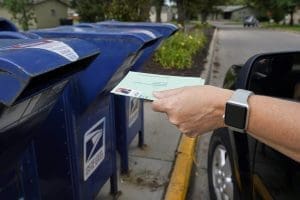Democrats sue over 'unlawful and arbitrary' ballot rejection in North Carolina
A coalition of Democratic groups aims to prevent disenfranchisement in the November general election.

A trio of Democratic groups sued the North Carolina State Board of Elections this week, alleging that the state is engaging in the “unlawful practice of rejecting absentee ballots based on irrelevant technicalities, and then arbitrarily denying certain voters the opportunity to address these minor errors.”
According to the lawsuit, filed on Tuesday by the North Carolina Democratic Party, the Democratic Senatorial Campaign Committee, and the Democratic Congressional Campaign Committee, voters can currently correct mismatched signatures on questioned ballots, but if the ballot is missing a witness or the address of a witness, then it is rejected.
The suit notes that a suit filed in May held “that the enforcement of numerous North Carolina elections statutes in the November 2020 election violated numerous federal constitutional rights, including the right to vote protected by the First and Fourteenth Amendments to the United States Constitution.” The current suit alleges that a Cure Memo issues by the North Carolina Board of Elections fails to remedy the issues.
“In practice, this means that if a voter submits a ballot that does not comply with the state’s witness requirement — including not printing the witness’s name, not printing the witness’s address, failure of the witness to sign, or even having the witness sign on the wrong line — they will have to wait to receive and then cast an entirely new ballot,” Marc Elias, a top voting rights attorney who is representing the Democratic groups in the lawsuit, said in a release announcing the legal challenge. “Voters who do not have enough time to cast a replacement ballot will not be notified at all that their ballot was thrown out.”
Similar signature-matching laws are being challenged in a number of other states, including Pennsylvania and Ohio.
Experts are warning that there could be a high rate of voter disenfranchisement through mail-in ballots being invalidated. Rates of mail-in voting in 2020 are rising as states try to avoid creating mass outbreaks of the coronavirus through in-person voting this fall.
Voters most at risk of being disenfranchised are young people and people of color, groups that usually break toward Democrats.
The Republican National Committee is spending $20 million to try to stop mail-in voting or make it harder to vote by mail, including efforts to try to stop expanded access to mail-in ballots, ban ballot drop boxes, and block voters from fixing signature issues with their ballots.
Published with permission of The American Independent Foundation.
Recommended

New NC GOP chair flirts with bogus stolen election conspiracies
Simmons predecessor was a staunch 2020 election denier
By Jesse Valentine - April 19, 2024
Texas activists pushed abortion restrictions in NM cities and counties, records show
Emails reveal influence and control in exchange for promises of legal help
By Austin Fisher, Source NM - March 04, 2024
Cannabis workers across Missouri begin push to unionize dispensaries
The first day was a breeze. Sean Shannon and Danny Foster walked into several marijuana dispensaries around Missouri with their matching “Union For Cannabis Workers” shirts and talked to employees about the possibility of unionizing. “The first day, there were 57 stops amongst the teams,” said Shannon, lead organizer with UFCW Local 655, which actually […]
By Rebecca Rivas - December 04, 2023









































































